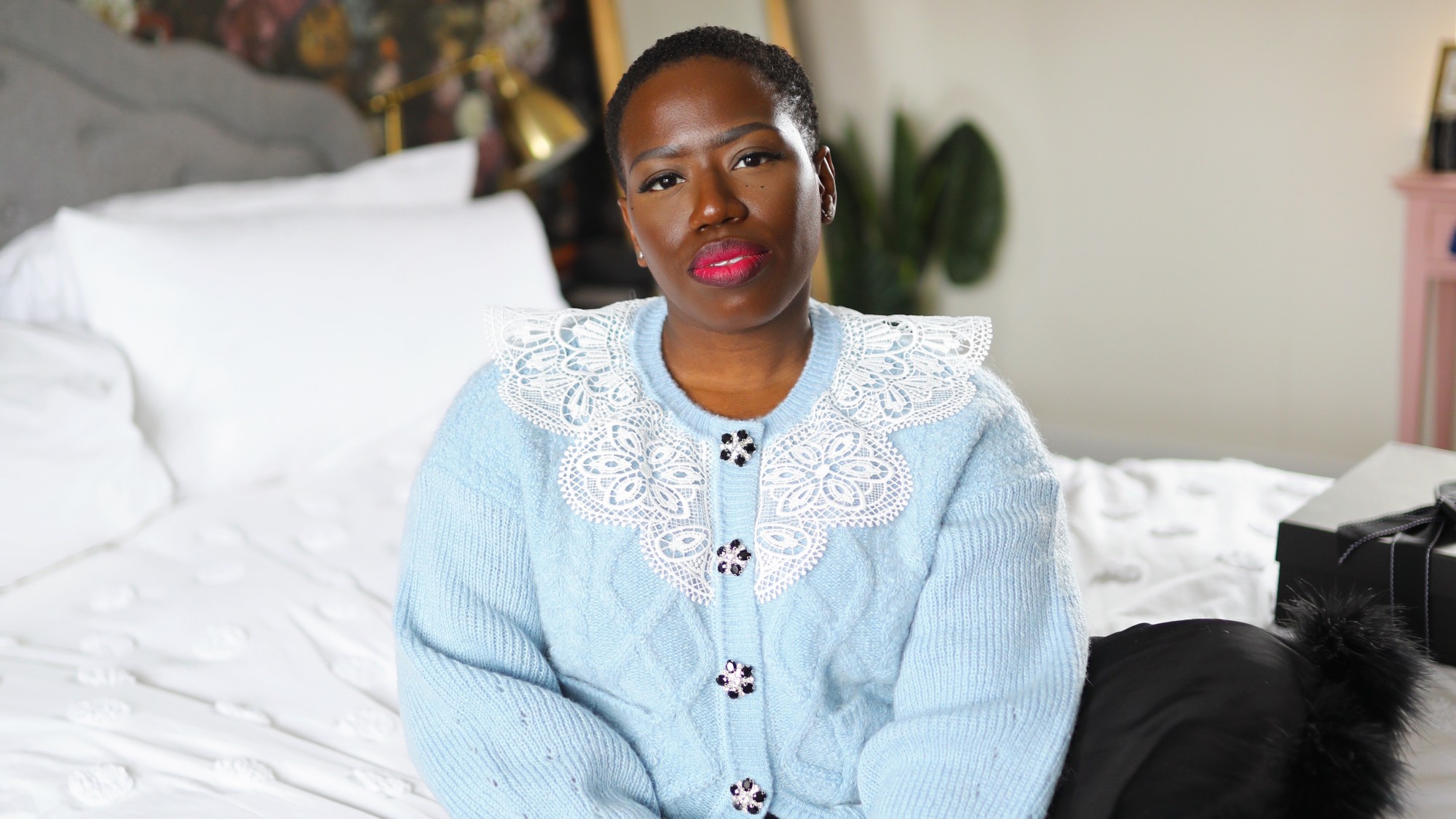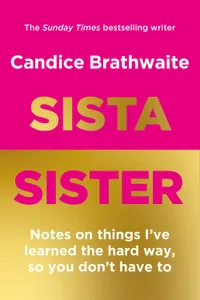Candice Brathwaite: Why are we still so obsessed with what men think of women?
As her much-anticipated second book Sista Sister hits the shelves, bestselling author and activist Candice Brathwaite tells us what she wishes she'd known about relationships, interracial dating, and dulling your shine to get someone to like you.


As her much-anticipated second book Sista Sister hits the shelves, bestselling author and activist Candice Brathwaite tells us what she wishes she'd known about relationships, interracial dating, and dulling your shine to get someone to like you.
Words by Candice Brathwaite
Growing up, I realised early on that women seemed to be obsessed with what men thought of them. The popular reading material at the time was books such as Men Are from Mars, Women Are from Venus and He’s Just Not That Into You. Oh, and it wasn’t just the books. The most popping movies all seemed to be centred on a woman getting her heart broken or getting over a heartbreak. Even the more age-appropriate shows – mostly American sitcoms like Moesha, Sister, Sister and my favourite movie/sitcom of all time, Clueless – seemed to be comfortable in regurgitating storylines that always showed girls wanting to get a guy to notice them.
'It’s galling to think we are in a time where women still feel judged by their relationship status'
I am deeply concerned by how becoming someone’s wife is still being upheld as the ultimate prize. Recently I came across a person’s social media profile. In the space for the biography it simply said ‘Wife’. OK, I’m lying, there was also a ring emoji. But that was it. Just ‘Wife’. I slowly tilted my phone back and forth as if it were a hologram about to reveal something else, but of course nothing else appeared. Long after I had found another way to fill my time, I could not help but wonder who this woman was. What was her name? What did she enjoy doing? Was she a receptionist? A dancer? A neurosurgeon? And why on earth did it bother me so much that the only thing she wanted to share was the fact she was married.
Read moreRead less▼
Sista Sister by Candice Brathwaite (hardback) – £16.99 | Waterstones
I know that as a feminist, I should be able to let it go, as that was her choice. But I couldn’t help it. Even though I have a significant other with two children and a dog, this is not the information that I like to lead with. It’s galling to think we are in a time where women can do many things, including be vice president in the highest office in the land, and yet some of us still feel silently judged by society based on our relationship status. Although I understand the pressures, I personally feel like announcing the fact that someone wanted to make you their wife is . . . boring. Not only that, it implies that anything else you have achieved is simply a stepping-stone to that point. Now, more than ever, I would love to see all talk of marriage, babies and relationships to be add-ons, the appendix, something that is separate to one’s core identity rather than a definition of one’s worthiness as a woman.
Since the beginning of my time, I have had front row seats to watching black women sacrifice every molecule of themselves to bag a man. I have also watched too many black women allow their spirits to curl up and die because being in an unhappy relationship seemed better than being in no relationship at all.
'A marital status is no substitute for a personality trait'
I think it’s important to encourage women to go where the love is. So, if that means widening your dating net to experience being with people who aren’t the same race as you, I would ask you to do that without hesitation. As a black woman I have found that dipping my toe into the interracial sea has not been without its choppy waters. After my experiences with men of a variety of races, I think it would be insincere of me to preach that this should be the first or only kind of love black women specifically should be looking for. The reality is that black women have got to align themselves with the idea that we are entitled to go where the love is, whatever the colour. Even if that makes others uncomfortable.
Celebrity news, beauty, fashion advice, and fascinating features, delivered straight to your inbox!
Few things make me feel sadder than to watch these women contort themselves into becoming everything they have been tricked into thinking the opposite sex will find attractive, only to end up in relationships which over time loose their shine. Not only will they have settled for less than they deserve, but they have also perhaps offered up a version of themselves which is not a reflection of their most authentic selves at all. When we step away from the archaic societal expectations of heterosexual long-term relationships, it’s amazing to see how many versions are on offer, if we’re able to put the judgements of others on mute.
What I wish I’d known:
- Black women specifically should not feel indebted to the idea of a relationship that is so often withheld from them. Confidently go where the love is.
- A marital status is no substitute for a personality trait.
- The love you receive from another cannot match the love you have for yourself.
- Like all relationships, interracial ones take work. And it is never too late to check if you are being fetishised or used as a preference to dissolve self-hatred.
Maria Coole is a contributing editor on Marie Claire.
Hello Marie Claire readers – you have reached your daily destination. I really hope you’re enjoying our reads and I'm very interested to know what you shared, liked and didn’t like (gah, it happens) by emailing me at: [email protected]
But if you fancy finding out who you’re venting to then let me tell you I’m the one on the team that remembers the Spice Girls the first time round. I confidently predicted they’d be a one-hit wonder in the pages of Bliss magazine where I was deputy editor through the second half of the 90s. Having soundly killed any career ambitions in music journalism I’ve managed to keep myself in glow-boosting moisturisers and theatre tickets with a centuries-spanning career in journalism.
Yes, predating t’internet, when 'I’ll fax you' was grunted down a phone with a cord attached to it; when Glastonbury was still accessible by casually going under or over a flimsy fence; when gatecrashing a Foo Fighters aftershow party was easy-peasy-lemon-squeezy and tapping Dave Grohl on the shoulder was... oh sorry I like to ramble.
Originally born and bred in that there Welsh seaside town kindly given a new lease of life by Gavin & Stacey, I started out as a junior writer for the Girl Guides and eventually earned enough Brownie points to move on and have a blast as deputy editor of Bliss, New Woman and editor of People newspaper magazine. I was on the launch team of Look in 2007 - where I stuck around as deputy editor and acting editor for almost ten years - shaping a magazine and website at the forefront of body positivity, mental wellbeing and empowering features. More recently, I’ve been Closer executive editor, assistant editor at the Financial Times’s How To Spend It (yes thanks, no probs with that life skill) and now I’m making my inner fangirl’s dream come true by working on this agenda-setting brand, the one that inspired me to become a journalist when Marie Claire launched back in 1988.
I’m a theatre addict, lover of Marvel franchises, most hard cheeses, all types of trees, half-price Itsu, cats, Dr Who, cherry tomatoes, Curly-Wurly, cats, blueberries, cats, boiled eggs, cats, maxi dresses, cats, Adidas shelltops, cats and their kittens. I’ve never knowingly operated any household white goods and once served Ripples as a main course. And finally, always remember what the late great Nora Ephron said, ‘Everything is copy.’

